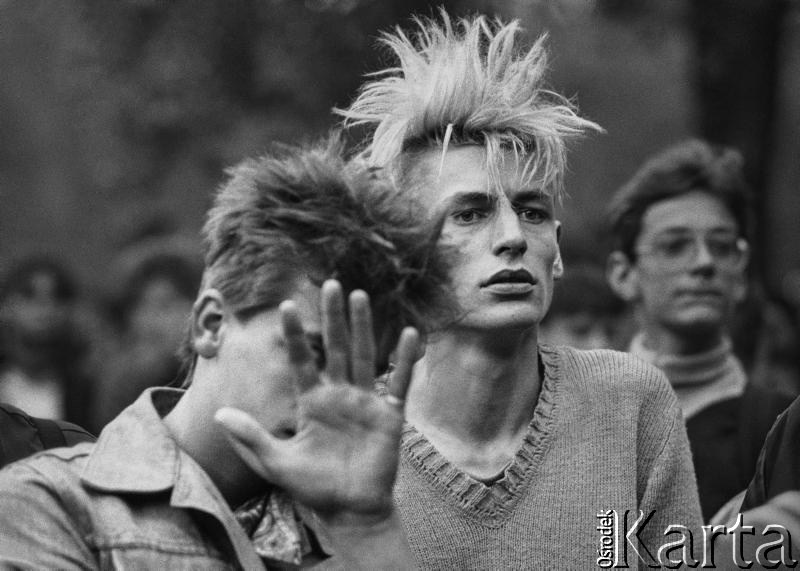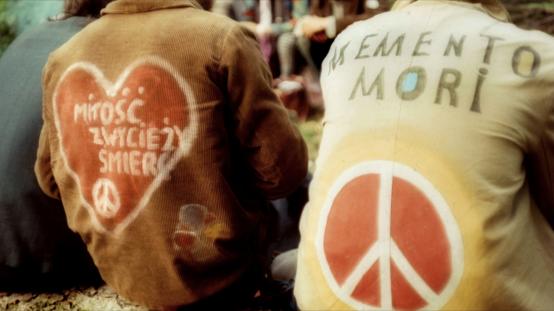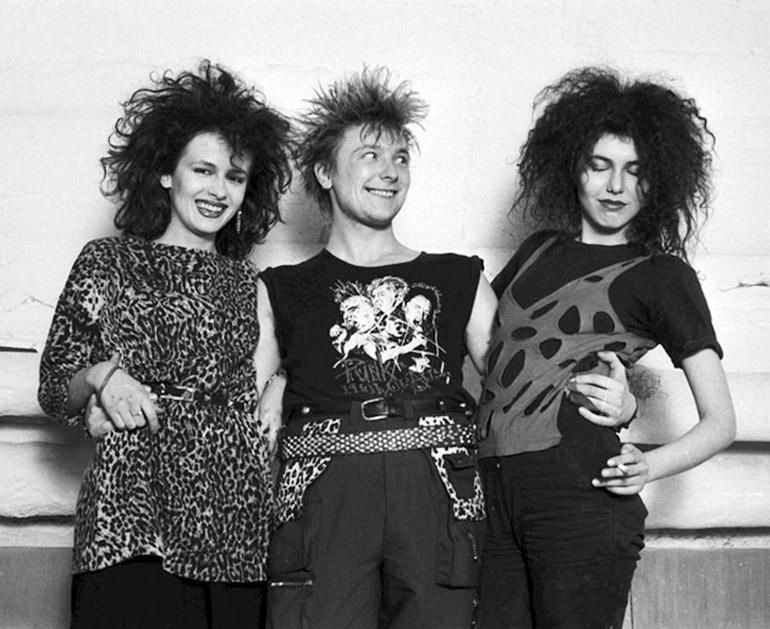|
|
Post by pjotr on May 18, 2022 1:21:36 GMT 1
The Polish bands sound pretty much like the American Punks of the Angrey Samoans. Polish Punk Rock was also political, it was an Anarchist reaction against the Polish communist system, forced collectivism and forced conformity of the Socialist state system.
As a young man you could/can get a lot of anger out in Pogo dancing and listening to this music.
Beling released of anger, irritations and frustrations about things without doing harm.
The same with Hard Rock and Heavy Metal. Motörhead was a band in the borderzone between Hard rock, Punk-rock and Heavy Metal
The band has quite a lot of fans in Poland too. This is a concert of Motörhead in Warsaw.
|
|
|
|
Post by pjotr on May 18, 2022 1:22:12 GMT 1
|
|
|
|
Post by pjotr on May 18, 2022 1:24:10 GMT 1
|
|
|
|
Post by pjotr on May 18, 2022 1:28:07 GMT 1
|
|
|
|
Post by pjotr on May 18, 2022 1:38:03 GMT 1
Punk in Poland of the 1980s Anarchist Autonomous Punk rock sing of the eighties, used by Anarchist squaters Anarchist Autonomous Punk rock sing of the eighties, used by Anarchist squaters 29th July – 2nd August 1986, a rock festival in Jarocin, Polish Peoples Republic, photo: Wojciech Druszcz / Karta CentreIn Poland of the 1980s punk rock involved the tough and aggressive music as well as the ideology that were banned. Regardless of a communist state hostility, the Polish punk has survived and is still popular in some social circles. 29th July – 2nd August 1986, a rock festival in Jarocin, Polish Peoples Republic, photo: Wojciech Druszcz / Karta CentreIn Poland of the 1980s punk rock involved the tough and aggressive music as well as the ideology that were banned. Regardless of a communist state hostility, the Polish punk has survived and is still popular in some social circles.
Provocation and rebellion were two essential values that might have been regarded as a source of inspiration for the Polish punk artists' creation. The song's text has been always important regarding the Polish punk rock music. The lyrics by Polish punk bands were against: conformity, mass production and consumption, stupidity, social inequality, communist system hypocrisy. Punk music in Poland gave an opportunity to express the opinions that were basically contrary to the views held by the communist Polish state in the1980s. Thus, the punk music those times was censored by the red Polish authorities. Unlike other genres of rock music such as: heavy metal rock, classic rock, new romantic, disco, italo disco, or even black metal, Polish punk rock was not allowed to participate in the market. One must know that the communist Poland in the 1980s was not entirely cut off from the Western culture's influence. The rock music by American and European bands was available to ordinary people, fans. However, the Polish show business was not interested in punk rock bands because their creation and activities were slightly "politically incorrect". The Polish establishment would rather promote any other sort of music. Punk was perceived as a danger to "the People's democracy". Paradoxically, the communist state prohibition of punk creations made it much more popular amongst the Polish youth. In response to the state sanctions against popularizing punk, the unofficial distribution system of the punk music occurred. The tapes as well as the vinyl records containing the music that could not have been bought in any shop or store were given from hand to hand.

The punk creation seemed to be based on the sincerity and frankness of artists. The songs were devoted to every day problems encountered not only by the adolescents but also the adults living in those hard times.
The Polish punk of the 1980s was an anticommunist movement. Furthermore, some punk movement followers also belonged to the independent associations that fought back against the communism and the red hypocrisy in "people's republic of Poland". We must focus our attention on NZS (The Independent Youth Association) and SOLIDARNOŚĆ (Solidarity). NZS, SOLIDARNOŚĆ and punk were illegal in the communist Poland. Moreover, SOLIDARNOŚĆ and punk formed an antitotalitarian front. SOLIDARITY members represented a variety of professions, points of view, values, social classes and mores, religions, education levels. During that historical period in Poland all of them were united in their battle against communism and totalitarism.
The readers in the West should have known that SOLIDARITY was very popular among the musicians and fans of punk rock in the Western Europe, USA and Canada. For example, a smashing British band ANGELIC UPSTARTS dedicated their song entitled: "Solidarity" to the Polish movement. The lyrics should have paid a tribute to the pioneers - workers of "Lublin July", that is still so easy to forget (FSC LUBLIN, WSK ŚWIDNIK) and "Gdańsk August". The crews of those factories were the first, in the entire country, who went on strike not only for a better pay but to rebel against the Polish communist state tyranny.
Polish punk rock in the 1980s Still from the film 'History of Polish Rock', photo: press releaseTaking into account the Polish punk rock, it originated quite when the Polish strikes took place. The first Polish punk rock bands were: SS 20 (DEZERTER nowadays), KRYZYS, BRYGADA KRYZYS (Tomasz Lipiński - the leader of that band established a little bit later cool TILT), SIEKIERA, TZN XENNA, MOSKWA, PROWOKACJA, KARCER, REJESTRACJA, T.LOVE ALTERNATIVE, KULT, KOBRANOCKA, ŚMIERĆ KLINICZNA. Still from the film 'History of Polish Rock', photo: press releaseTaking into account the Polish punk rock, it originated quite when the Polish strikes took place. The first Polish punk rock bands were: SS 20 (DEZERTER nowadays), KRYZYS, BRYGADA KRYZYS (Tomasz Lipiński - the leader of that band established a little bit later cool TILT), SIEKIERA, TZN XENNA, MOSKWA, PROWOKACJA, KARCER, REJESTRACJA, T.LOVE ALTERNATIVE, KULT, KOBRANOCKA, ŚMIERĆ KLINICZNA.
In Poland of the 1980s it was not anything uncommon to see the agents called "Ubeks" or "Sbeks" during the punk rock gigs. They were manipulating with skinheads and hooligans to make them hostile and aggressive towards the punk rockers. The musicians of the Polish punk bands as well as the fans were sometimes treated as "class enemies" (enemies of the People's democracy).Jarocin was bustling with punks activity in the 1980s Nocne Szczury were a Polish punk rock band from Władysławowo. The fans of punk rock in Poland gathered also in Jarocin not far away from Poznań. As far as I know Jarocin became a famous place after the festival of the independent music had been held there. Polish punks that came from various sites of Poland (East, West, North and South) used to meet there. Jarocin in the 1980s was the capital of the nonconformist art. The bands that played concerts and their fans in Jarocin felt free to show that the communist reality in Poland, they were forced to put up with, was a nuisance. They were also systematically and carefully watched by the secret agents and militia. It happened that some artists or punks were arrested for their look, strange behaviour or the pogo. Pogo dance was often misinterpreted by the Polish militia as an extreme form of a teenage aggression. Fortunetely, later they found out that it was just a punk ritual that could have symbolized helplessness, worthlessness, simplicity and the feeling that the punks' unity was strength.An Unofficial newspaper - a fanzineTo end with, the thing that is worth writing concerns an unofficial newspaper (a fanzine). It was actually invented by punk rockers. As for the cool Polish punk fanzines, their creators had got the guts to present all the stuff that was forbidden by communists those times. Thus, the Polish fanzine was an underground newspaper. Afterwards, the fans and artists representing other kinds of music, especially heavy metal rock, borrowed the idea of fanzine from punks. Nocne Szczury were a Polish punk rock band from Władysławowo. The fans of punk rock in Poland gathered also in Jarocin not far away from Poznań. As far as I know Jarocin became a famous place after the festival of the independent music had been held there. Polish punks that came from various sites of Poland (East, West, North and South) used to meet there. Jarocin in the 1980s was the capital of the nonconformist art. The bands that played concerts and their fans in Jarocin felt free to show that the communist reality in Poland, they were forced to put up with, was a nuisance. They were also systematically and carefully watched by the secret agents and militia. It happened that some artists or punks were arrested for their look, strange behaviour or the pogo. Pogo dance was often misinterpreted by the Polish militia as an extreme form of a teenage aggression. Fortunetely, later they found out that it was just a punk ritual that could have symbolized helplessness, worthlessness, simplicity and the feeling that the punks' unity was strength.An Unofficial newspaper - a fanzineTo end with, the thing that is worth writing concerns an unofficial newspaper (a fanzine). It was actually invented by punk rockers. As for the cool Polish punk fanzines, their creators had got the guts to present all the stuff that was forbidden by communists those times. Thus, the Polish fanzine was an underground newspaper. Afterwards, the fans and artists representing other kinds of music, especially heavy metal rock, borrowed the idea of fanzine from punks.
|
|
|
|
Post by pjotr on May 18, 2022 1:38:21 GMT 1
|
|
|
|
Post by pjotr on May 18, 2022 1:39:11 GMT 1
|
|
|
|
Post by pjotr on May 27, 2022 17:54:52 GMT 1
Poland has always been a very open country to new music genres and even before the fall of the communism, music styles like rock, metal, jazz, electronic, and new wave were well-known.[8] Since 1989, the Polish scene has exploded with new talents and a more diverse style.
Every year, a huge gathering of young Poles meet to honour the rock and alternative music in Jarocin, Żary, at Woodstock Festival Poland in Kostrzyn nad Odrą and at Open'er Festival and Off Festival. These events often attract more than 250,000 people and are comparable to the gatherings in Woodstock and Roskilde.
In jazz music, Polish musicians created a specific style, which was most famous in 1960s and 1970s. Some prominent Polish jazz artists are: Krzysztof Komeda, Zbigniew Namysłowski, Adam Makowicz, Tomasz Stańko, Włodek Pawlik, Michał Urbaniak, Leszek Możdżer. Some of the most popular and commercially successful Polish vocalists of 20th and 21st centuries are Czesław Niemen, Edyta Górniak, Myslovitz, Doda, Maryla Rodowicz, Kamil Bednarek, Ewa Farna, Agnieszka Chylińska, Sylwia Grzeszczak, Michał Szpak, Edyta Bartosiewicz, Anna Maria Jopek, Kasia Nosowska, Dawid Podsiadło, Sarsa, Monika Brodka and Margaret.
Two contemporary big Polish music festivals are Opole Festival and Sopot Festival. Among other important festivals there are: Jazz Jamboree, Rawa Blues Festival and Wratislavia Cantans.
|
|
|
|
Post by pjotr on May 27, 2022 17:56:14 GMT 1
|
|
|
|
Post by pjotr on May 27, 2022 17:57:19 GMT 1
|
|
|
|
Post by pjotr on May 27, 2022 18:01:40 GMT 1
|
|